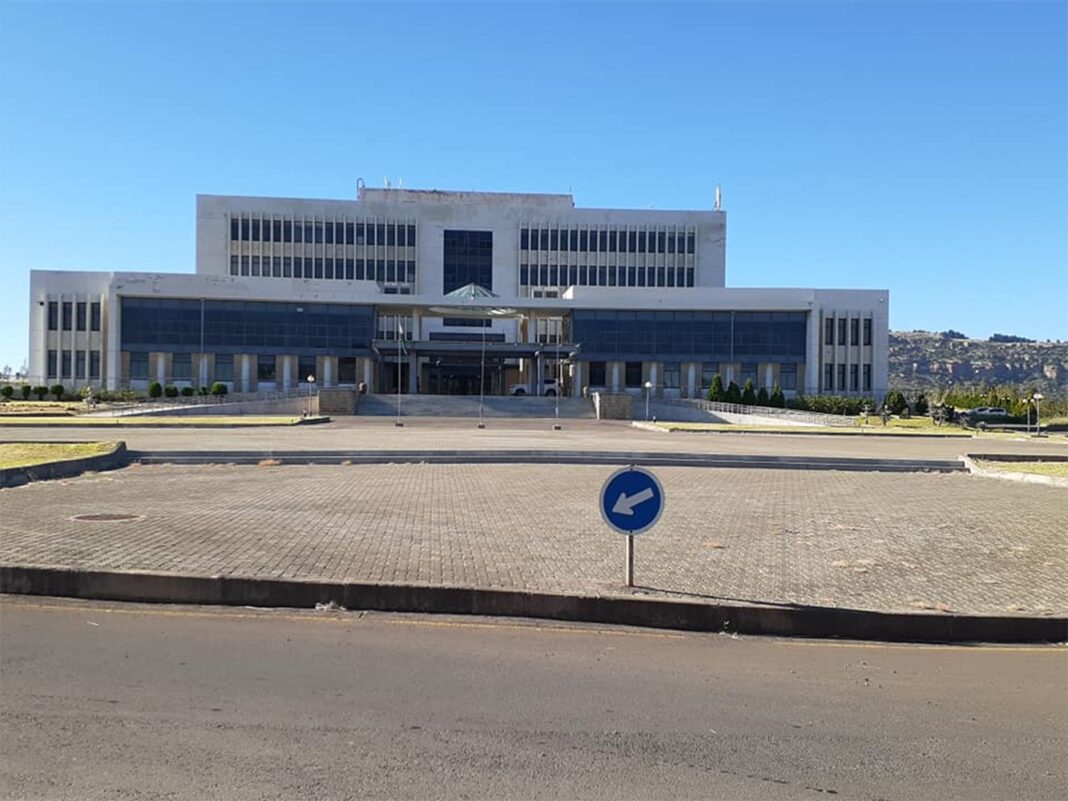The ministry of local government, chieftainship, home affairs and police has developed the National Spatial Development Framework (NSDF), a strategic planning tool designed to guide land use, housing infrastructure and other forms of development across the country.
The NSDF aims to address uncoordinated development which has negatively impacted sustainable development and promote coordinate and sustainable development.
In an interview with theReporter’s ‘Mantšali Phakoana, commissioner of Lands, ‘Masebele Mponye discusses how the NSDF plans to deal with some of the challenges facing Lesotho’s development, such as uncoordinated and unsustainable development.
Please tell us about the National Spatial Development Framework and its key principles?
The National Spatial Development Framework (NSDF) is an overarching strategic planning tool designed to guide land use, housing infrastructure, and other forms of development across Lesotho.
The framework is intended to provide the direly needed guidance to put physical development on a more sustainable and equitable basis. The envisaged benefits from having an NSDF would not only be for ministries but also for the general populace and business, to mention a few.
It also aims to address the challenges of uncoordinated development, such as illegal settlements and construction in unsuitable locations, which have negatively impacted sustainable development in the country.
Key principles:
Sustainability: Ensuring that land use and infrastructure development are ecologically sustainable.
Equity: Promoting equitable development across different regions to reduce spatial inequalities.
Efficiency: Rationalising the use of resources and infrastructure to support optimal economic growth.
Coordination: Facilitating collaboration between various ministries and agencies to ensure consistent policy implementation.
Inclusivity: Ensuring that all stakeholders, including marginalised communities, are involved in the planning process.
How will the framework contribute to sustainable and inclusive development in Lesotho?
The NSDF contributes to sustainable and inclusive development by providing a structured approach to planning that ensures resources and development efforts are distributed equitably across the country. It supports sustainable land use practices, guides infrastructure investments, and promotes the development of services in both urban and rural areas.
The framework also aligns with national strategies like the Sustainable Development Goals (SDGs) and the National Strategic Development Plan (NSDP) II, thereby fostering inclusive growth and reducing regional disparities.
How will the framework address spatial inequality and promote social and economic inclusion?
The NSDF addresses spatial inequality by guiding the development of Local Area Plans (LAPs) within a broader national context, ensuring that disadvantaged regions receive appropriate investments in infrastructure and services.
By providing a spatial basis for allocating resources, the NSDF ensures that underdeveloped areas are prioritised for development, thereby promoting social and economic inclusion. Additionally, it informs the distribution of government facilities and services, ensuring that all communities have access to essential infrastructure and opportunities.
What are the anticipated challenges and opportunities associated with implementing the framework?
Challenges: Coordination: Achieving effective collaboration among multiple ministries and departments may be challenging due to varying mandates and priorities.
Resource Constraints: Limited financial and human resources could impede the comprehensive implementation of the framework.
Data Management: Establishing and maintaining a robust spatial data infrastructure will require significant investment and technical expertise.
Opportunities: Improved Planning: The NSDF offers the opportunity to improve the efficiency and effectiveness of national and regional planning efforts.
Economic Growth: By guiding investments to strategic areas, the framework can stimulate economic growth, particularly in underserved regions.
Environmental Protection: The framework provides a structured approach to balancing development with environmental conservation, supporting long-term sustainability.
At a fundamental level, the management of land is of critical importance to the wellbeing of any country and Lesotho is no exception in this regard.
How with the framework be aligned with other relevant national provincial policies and strategies?
The NSDF is designed to integrate with existing national and provincial policies, such as the NSDP II, Vision 2020, and the Poverty Reduction Strategy.
By providing a spatial dimension to these policies, the NSDF ensures that development initiatives are geographically coordinated and aligned with broader national goals. This alignment is achieved through the collaboration of various ministries and departments, as well as through regular consultations and data sharing.
How will the NSDF address issues of housing, urbanisation and human settlement development?
The NSDF is designed to integrate with existing national and provincial policies, such as the NSDP II, Vision 2020, and the Poverty Reduction Strategy. By providing a spatial dimension to these policies, the NSDF ensures that development initiatives are geographically coordinated and aligned with broader national goals.
This alignment is achieved through the collaboration of various ministries and departments, as well as through regular consultations and data sharing.
What is the expected timeframe for implementing the NSDF, and how will progress be monitored and evaluated?
The period to produce the final approved NSDF report is set at 15 months. Progress with the preparation of the NSDF will be monitored mainly by the proposed NSDF Steering Committee.
This committee will meet monthly to oversee progress and to provide guidance to the project. It will comprise representation from the relevant ministries and selected outside stakeholders.
An evaluation of the project will be undertaken mainly through getting responses from the key stakeholders.
How will the framework balance environmental conversation and economic development objectives?
The NSDF aims to balance environmental conservation with economic development by promoting sustainable land use practices that protect natural resources while supporting growth.
The framework provides guidance on where and how development should occur to minimise environmental impact, such as avoiding construction on erosion-prone soils or in flood plains. It also supports the implementation of policies that integrate environmental conservation into economic planning, ensuring that development contributes to long-term sustainability.
What mechanisms will be put in place to ensure effective collaboration and coordination among stakeholders implementing the framework?
The NSDF’s implementation will be overseen by a steering committee, which will include officials from key ministries, agencies, and departments. This committee will serve as an advisory body, fostering collaboration among stakeholders, providing necessary data and documentation, and overseeing the consultant’s work.
Regular meetings, data sharing, and joint planning sessions will ensure that all stakeholders are aligned and working towards the same goals. Additionally, sub-committees may be formed to address specific issues or challenges.
How will the framework support and integrate rural development and land reform efforts?
The NSDF supports rural development by providing a spatial framework that guides investments in rural infrastructure, services, and economic activities.
It integrates land reform efforts by ensuring that land use management and control policies are updated to reflect the needs of rural areas, promoting equitable access to land and resources. The framework also emphasizes the importance of protecting agricultural land and supporting sustainable farming practices, which are critical for rural livelihoods.
How will the NSDF contribute to poverty alleviation and economic growth in disadvantaged communities and rural areas?
The NSDF contributes to poverty alleviation by directing development efforts to disadvantaged and rural areas, ensuring that these communities receive the infrastructure, services, and economic opportunities needed for growth.
By providing a spatial basis for government spending and private investment, the framework helps create jobs, improve access to essential services, and stimulate local economies. This, in turn, supports economic growth and reduces poverty in some of Lesotho’s most vulnerable regions.









